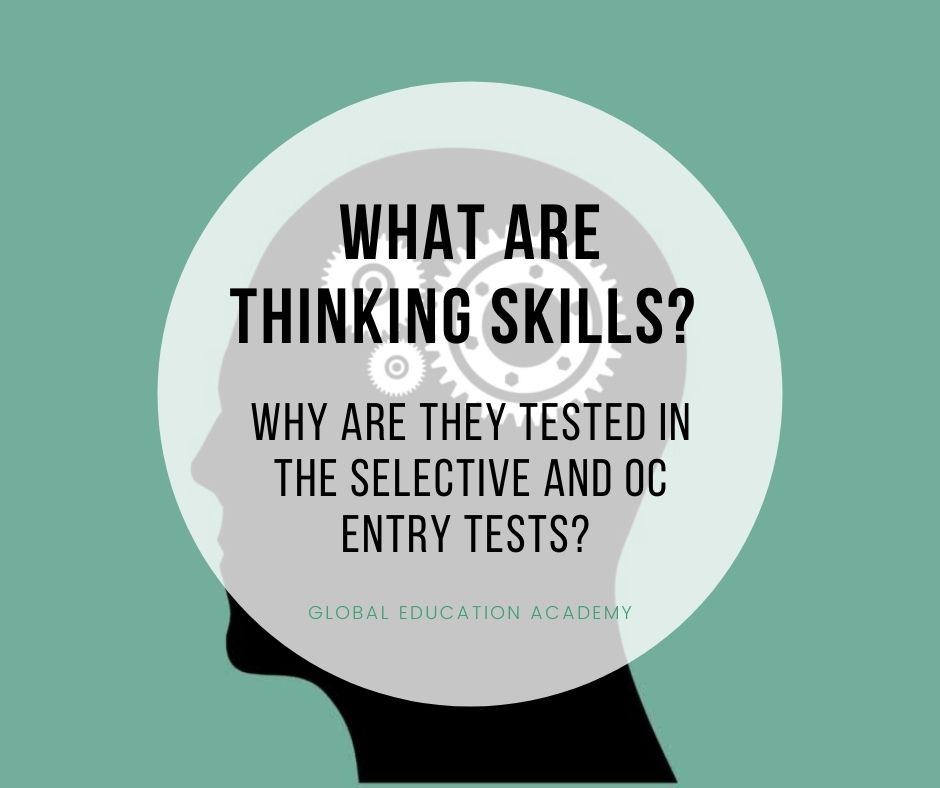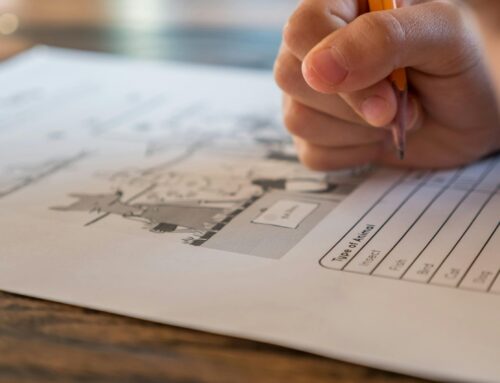What are thinking skills? Why are they tested in the Selective and OC Entry Tests?
Did you know that two of the top skills employers look for are critical thinking and problem solving? In other words, thinking skills.
This means having well-developed thinking skills is key to being highly employable. By the time you reach university, it’s too late to effectively develop these foundational skills. It needs to begin in the classroom.
It is why we’ve seen a shift in the selective school and opportunity class placement test designs to a greater emphasis on assessing thinking skills. At Global Education Academy, we support this needed change!
You’ve probably come across the term ‘thinking skills’ many times, without stopping to consider what it means. With the growing attention on the merit of thinking skills in the Australian education system, how do we define and identify thinking skills?
What are thinking skills?
“Thinking skills, or cognitive skills, are, in large part, things you do with knowledge.”
– Peter Ellerton (Lecturer in Critical Thinking)
Thinking skills is the broad term used for the mental activities you use to process information, connect concepts, and make decisions.
We all have thinking skills and use them to some degree every day. However, this does not mean we use them effectively. Like any other skill, we can further develop our thinking skills.
According to the NSW Department of Education, thinking skills set a foundation for lifelong learning and are crucial for success in the 21st century. The rise of artificial intelligence and machine learning across industries is seen as a threat to job security for many. It’s superior thinking skills combined with knowledge that employers value.
Thinking skills range from learning and recalling facts through to more complex skills such as analysis and problem solving. For this blog, we’ll focus on two higher order thinking skills – critical thinking and problem solving.
Problem–solving versus critical thinking
From our research, we found that the Cambridge thinking skills framework consists of two key elements:
- Problem-solving
- Critical thinking
- Problem-solving
Problem solving is the skill to identify, define and solve a problem given a set of information. It’s made up of three types of questions:
- Relevant selection – selecting key information and ignoring redundant information. This typically involves a large amount of data that must be sifted through to find an answer.
- Finding procedures – identifying a method that will arrive at a solution. This covers a wide array of different questions, all requiring mathematical problem-solving techniques or logical deduction.
- Identifying similarity – looking for similarity between objects or information. These questions normally have sets of identical data or patterns with some information missing, the missing information must be found by comparing the identical objects/patterns.
Critical thinking
The Australian Curriculum identifies critical thinking as “the core of most intellectual activity that involves students learning to recognise or develop an argument, use evidence in support of that argument, draw reasoned conclusions, and use information to solve problems.”
Critical thinking is seen as a general capability developed across different subjects. For the placement tests, critical thinking will be mainly English based, testing 7 component skills:
- Identify the main conclusion – finding a statement supported by the rest of the information given.
- Drawing a conclusion – identifying a conclusion not stated in the test but can be drawn from it.
- Identifying an assumption – something not stated in the text but is taken for granted in order to draw the main conclusion.
- Assessing the impact of additional evidence – identifying what additional information will strengthen or weaken an argument.
- Detecting reasoning errors – finding a flaw in the argument.
- Matching arguments – identifying similarly structured arguments.
- Applying principles – apply the principles which underline an argument on another argument.
Thinking skills questions will take more time to solve than the previous general ability section of the placement tests.
How to develop thinking skills
Yes, there’s more focus on thinking skills but it’s not a new concept. Global Education Academy’s approach to teaching is parallel to the recommendations for change. Empowering students with tools to think creatively and critically has been at the core of our practice.
We believe our students are not disadvantaged by the changes and develop our practice questions based on the Cambridge thinking skills framework to ensure they are well prepared.
Our strategies to teach and develop sharp thinking skills among our students include:
- Class discussions, activities and engaging with students through collaboration
- Using practice questions and problems drawn from real-life examples
- Allowing thinking time to apply skills
- Encouraging reflection on new concepts
- Encouraging making mistakes. This is how we learn!
When it comes to problem-solving, this is exactly what we teach in the mathematics classes from an early age. Using our UPSLTM strategy, problems are approached using four steps:
- Understand
- Plan
- Solve
- Learn
Many teachers, tutors and educators emphasise the solving step. Some emphasise the first three steps, while rarely you will find someone who really focuses on the fourth and the most important step – the learning step.
Ignoring this valuable step means that students solve questions for the sake of solving them, not for learning from them. Imagine that every question you solved during your schooling years empowered you with a schema built in your brain that you can use for other questions. Life during high school and or university would’ve been much easier!
That is what we do at Global Education Academy. We help students develop schemas so they become experts in their fields. With us, your child is equipped to build a solid foundation of thinking skills.
For more information about the role thinking skills will play in future placement tests, read our blogs on the changes to the Selective Placement Test and Opportunity Class Placement Test.


Share this article
Written by : Global Education Academy
Follow us

LOCATIONS
1 / 53-55 Montgomery Street Kogarah NSW 2217
4 William Steet Turramurra NSW 2074










